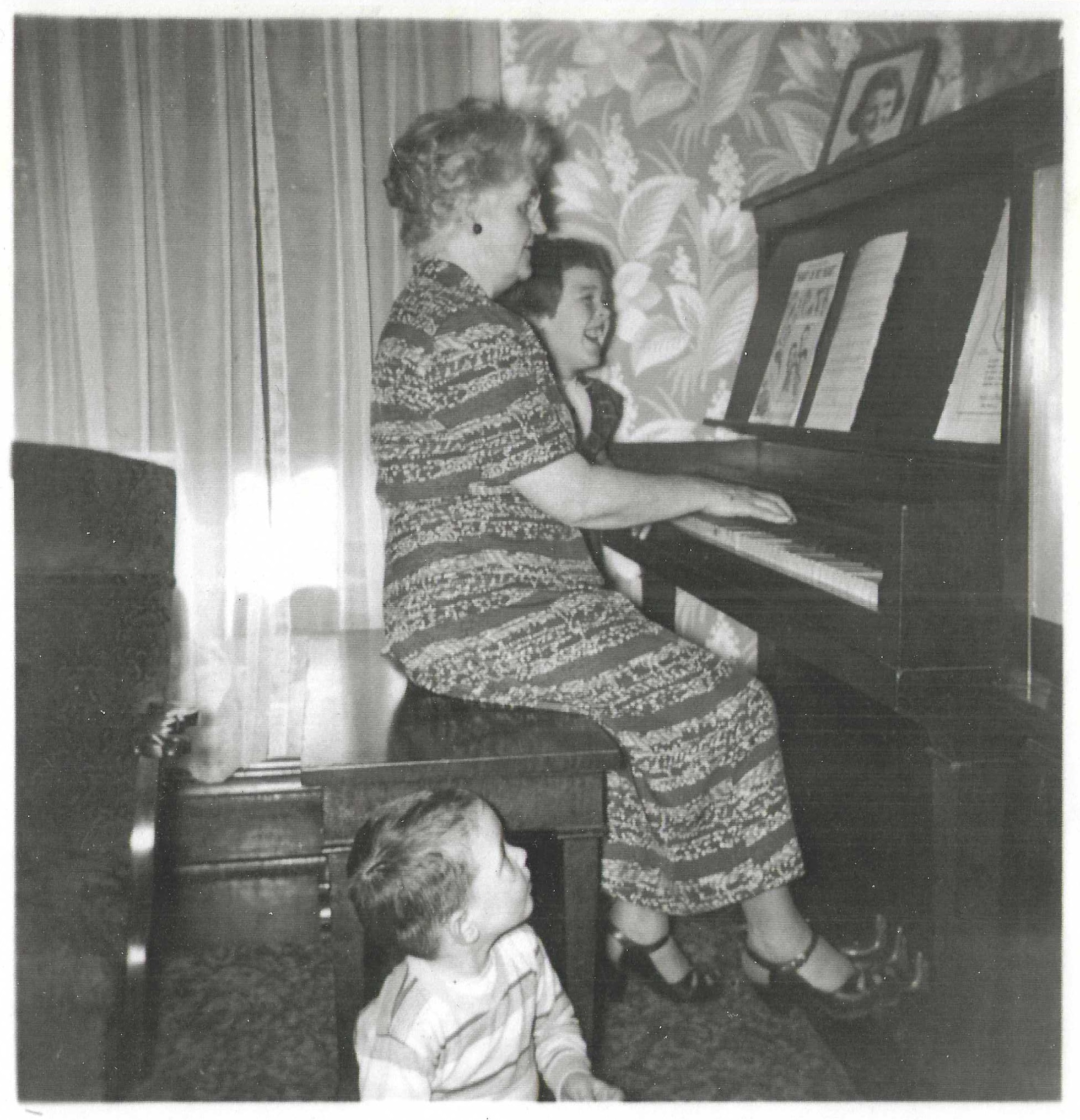
“For the love you bring won’t mean a thing / Unless you sing, sing, sing, sing, sing, sing, sing, sing” (—Sing by Travis)
Music is in my soul by nature and nurture, thanks firstly to my mother who herself was inspired by her Grandma Kate:

My mom took up piano at a young age but discovered she both loved it and had exceptional talent early on: playing all the weddings and funerals at her church by the fourth grade, did college on a full ride music scholarship, joined the USO Tour, and the list goes on. Instead of being a professional musician on the Lawrence Welk Show—she declined—she married my dad and taught music to grade school students and also played at our church, St. Cecilia’s, the patroness of music. So live piano music was a fixture in our home, and I grew up singing in church just one pew behind Mom because participating in sung worship wasn’t exactly optional. I also started my own piano lessons in kindergarten, but Mom’s policy was if you weren’t demonstrating your own motivation and love for piano by sixth grade, she wasn’t going to force it. And so I regrettably quit near that first opportunity.1
Then in the summer between my freshman and sophomore years of high school, my family was in northern Wisconsin on vacation and my mom was strumming an old nylon string guitar she had. “Mom, I didn’t know you played guitar,” I said incredulously. “Well, I had to demonstrate proficiency in three instruments for the USO Tour, so guitar ended up being one of my three, but I really only know a few chords… Come here; this song’s easy…” And she proceeded to show me the ‘D’, ‘A7’, and ‘G’ chords for the tune she was playing Blowin’ in the Wind). Once I got those first few chords down she said, “now I do have a rule that if you’re going to play guitar, you need to sing, too.” I had to concede the singing because I was hooked on the guitar. Mom had a book of songs from the Old Town School of Music and I went through nearly every song, forcing my fingers to make shapes they decidedly did not want to make, and belting folk melodies that Mom would occasionally harmonize to. I played all the time on that nylon string guitar until a Gibson gospel-style acoustic showed up one Christmas, well before I was capable enough to deserve playing something of such quality, but it motivated me all the more so.
I wasn’t a remarkable singer but I was singing at a time when most of my peers were not (I went to an all-boys school) because, hey, puberty makes it tricky for a while there. So, what the heck, I’ll get up on stage and perform at my high school talent show. Bob Marley’s Redemption Song, accompanied by percussion phenom Dan Capecchi on cajón. I’m not sure how well it went, but I liked something about getting up on stage and fighting through the intense butterflies. And so, I auditioned for the spring musical (Working by Studs Terkel) and landed a singing part…another test of the taming of the butterflies. And then rock bands, beginning with the high school cover band Obscurity that certainly lived up to its name.
Come college I had had enough time singing and playing and performing in front of people that I could audition for the Heightsmen of Boston College, BC’s all-male a cappella group, which would end up being a defining part of college. Musically, it improved my singing in the same way the Beatles improved: through sheer volume of rehearsals and performances and recording sessions. But it also enabled and exacerbated my music illiteracy by its model: instead of reading sheet music, our “music director” peer who had arranged a given song (in four parts) would teach each section (e.g. baritones) their part by ear, echoing the piano after it plucked out the sequence note by note. Why? Because three-quarters of us were iffy on music theory, and we were probably too lazy to figure out how to produce sheet music.
Post-college I found a real void in my life that the Heightsmen once occupied—some musical but also social/fraternal. It wasn’t until my dear friend and silk-smooth-singing’ fellow Heightsman Michael McAndrew moved back up to Boston for law school that he and I joined forces with jazz wunderkind Paul Findlen to start a band with a “soul-rock” feel2.
Before we ever got signed to a major label, I left for business school in Ann Arbor. Yes, there was a b-school band and open mic nights and such, but the major creative outlet was a revue called Follies.
I moved to Chicago and on the one hand was a part of a church choir that really pushed my music literacy with beautiful intricate liturgical pieces, and then on the other hand found myself in a cover band that had me singing screamy rock songs. I guess both have their place.
In California, I filled the music need with various jam sessions: my friend Patricia Ang’s Musical Playground, a monthly get-togeher at a member’s living room filled with instruments and harmonies and improvisation; Nolan Love’s “Harvest Party” in Petaluma… pretty hippie-sounding and so fun. And there was an annual “Coffeehouse” (open mic night/talent show thing) that was always fun. But the most importantly, I picked up the liturgical music ministry I had begun in Chicago, joining the 5:30pm Contemporary Choir at St. Dominic’s Church. And it was in the basement rehearsal room that I first met Lisa Chung, who would three years later become my wife—the very best result of my haphazard music odyssey.